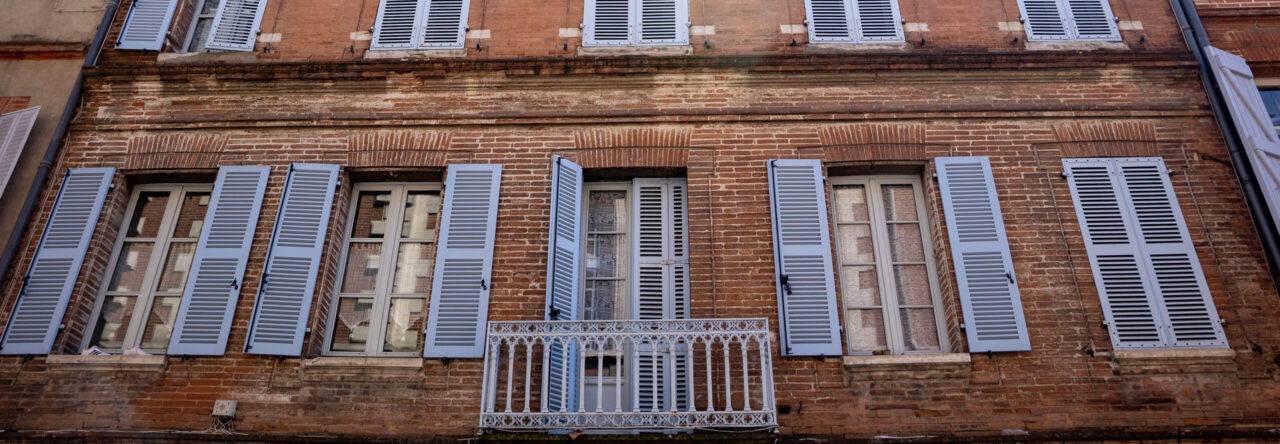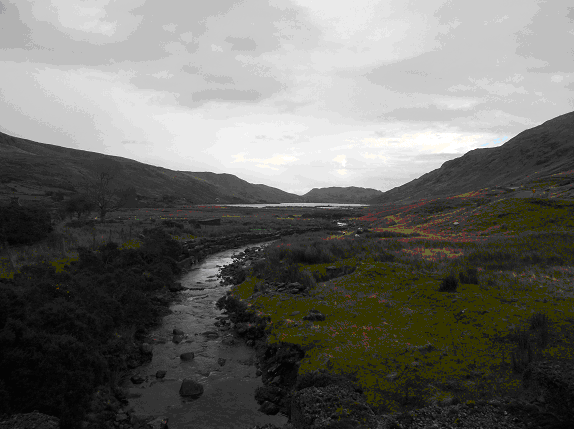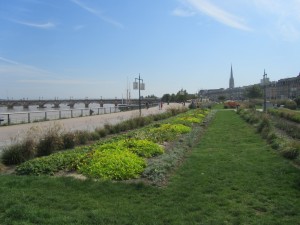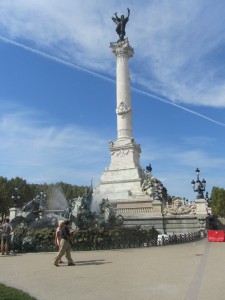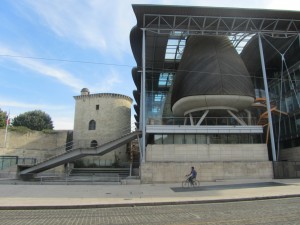A word from the Dickinson in France team
Dear students,
The sun stays in the sky longer, the days are hot, exams are ending and the students are leaving Toulouse for their summer plans. We want to thank you for this great year for the Dickinson in France program. It was a pleasure for us to accompany you during your discovery of French culture.
We wish you all good luck and we hope for a safe return safely to your families and that your studies continue smoothly.
It isn’t only the moment to say goodbye to the 2010-2011 students. We are preparing for the arrival of the next batch of students in September 2011. We can’t wait to meet you and to introduce you to the “ville rose.” We hope that you have a great summer and that you take the time to review the French language and to think of what you would like to discover in France.
We’d like to say « thank you and goodbye » to some and « see you soon ! » to others!
— The Dickinson in France team (Sylvie Toux, Laura Raynaud & Karen Kirner)
A word of thanks
Dear students,
I would like to thank you for your contributions to La Une during this year on the Dickinson in France program. I am happy to have worked with you on the blog. Thanks to your investment, I am proud of what we produced together.
I would like to give special thanks to the La Une team that worked the entire year to publish this monthly blog. I really appreciated the ideas and energy you brought to the table. Thanks for all of your contributions to La Une and for being persistent in soliciting articles from your classmates.
Thank you to Nicolas Garzon for sharing your love of Toulouse sports teams.
Thank you to Michael Rao for representing the second semester students.
Thank you to Madlen Chipeva for sharing your love for photography by documenting our class trips.
Thank you to Qichan Qian for pushing us to discover restaurants in Toulouse and in France.
Thank you toAnna Ciriani Dean for translating La Une each month.
I hope that the work invested in this blog was as enriching for you as it was for me.
Thank you for a great year with Dickinson in France !
–Karen Kirner, editor
Goodbye from a French-Cameroonian intern at the Dickinson Center in Toulouse (Or an intercultural internship experience)
These past four months were an opportunity for me to be a part of the Dickinson in France team and to observe and participate in the center’s daily functioning. But in particular, this period was an opportunity to meet lots of people, to question how to deal with the specificities of many cultures in an academic context. When I came to France to study five years ago, the prospect of becoming an independent Toulouse student instead of a vacationing tourist in Paris did not just scare me. It intrigued me. And this intrigue contributes without a doubt to motivating people to go beyond their horizons, to outdo themselves, but especially to rediscover themselves. The Dickinson students that I met in Toulouse all share the desire to discover French culture and to share their own culture. I appreciated their curiosity and their good humor as well as their ability to analyze and observe and their reactivity to new situations.
Sylvie Toux, Laura Raynaud and Karen Kirner, the association’s team, gave me the warmest of welcomes. I want to thank them for making every aspect of my internship pleasant. They work hard to enrich the Toulouse program from both an academic and a cultural point of view.
Let’s be less serious: I also discovered the mountains thanks to the center and slipping in the Pyrenees snow at -5°C was just as memorable as unexpectedly meeting Jean-Luc, a writer who lived in Cameroon at 35°C during the 60’s and who came back to live in his country of origin. The often repeated French saying “it’s a small world” is actually true.
Thanks to technological advances in communication in the world, we can leave, but we can also come back. You can leave the United States to discover France. And go back to the United States. You can leave Cameroon to study in France. Or you can come back to France after having worked in Cameroon. Or you can definitively settle down in France after leaving your home country. All of these moves, across the Atlantic or elsewhere, make the world as connected as it is today. But it’s the desire to go abroad to look at our own culture from a different angle, without completely losing it, that founds interculturalism. In short, my internship in the multicultural environment that is Dickinson in France is coming to an end, but I am happy to have learned so much about myself and others.
–Jessica N’koumba N’koumba
End – of – Year Reflexions
The team of students working on La Une took advantage of our time together during the excursion in Provence to ask their classmates questions about their experience in Toulouse. Here are some reflexions on the end of the semester or year in “La Ville Rose” :

Photo de Anna Geiserman.
There is no doubt that the Dickinson, WashU and Hood students will miss Toulouse. According to one student, Rossen Iankov, “What I’m going to miss is public transport and cafés, but especially the group of American students that shared my experience.” Other students in the program agree with Rossen, saying that they will miss their host families, their friends and the easiness of meeting people in Toulouse.
However, this isn’t a time to be sad, according to a WashU student, Bailey Davidson. “This was one of the best chapters of my life and although I am sad to leave to early, I will always be able to look back at my experience,” she says. Like many other students, she loved discovering the city of Toulouse and she cites Café Populaire, the Garonne river and Hôpital des Graves as her favorite places. Another student, Allison Fricke, thinks her host family’s garden is one of the most peaceful places in the world.
As for food, the American students took advantage of the French meal. A WashU student, Elizabeth Morrow, says, “I ate a lot of unique things in Toulouse. I’m so glad to have tried weird things like turkey heart and calf liver! You can’t make those things as easily in the United States, for sure.” Other students claim that their favorite dishes are ratatouille and duck although some of them still love hamburgers, even in France!
Yet all of the students agree that they will always remember the lessons learned from their experiences. They have had some ridiculous experiences, “especially at the Ramier,” says Allison, as well as some that have given them a new point of view on life. They now know the importance of being open to the world and they all know how to find shelter in a difficult situation or in an unknown place. In particular, they have learned how to appreciate a place and in the United States, they want to take advantage of our beautiful country.
Although the Dickinson in France students are all happy to see their American friends and family, they will surely miss the program. With a bit of luck, they will take their lessons learned and apply them wherever life takes them.
–Michael Rao
Jenna said…
Life lesson learned in France: « There is always a solution. » Whatever the situation, you can always find a solution.
The most surprising food eaten in France: blood sausage. She ate it before knowing that it was made with pig blood and she thought it tasted good, but in a weird way.
Her favorite places: the Jardin des plantes, the lawn next to the Garonne river where you can always sit in the son and take advantage of a beautiful day.
Like everyone, she is going to miss a lot of things when she goes back to the US. The best pastry shops and bakeries that make delicious pain aux chocolat and palm leaf pastries; cafés, place de la Trinité, where there are always performers who sing beautiful songs; and the Sherpa, where she had her first real French crêpe.
Erica said…
Although it’s very difficult to choose a favorite dish because there are so many choices, her favorite dish is warm goat cheese salad with honey.
She will miss the proximity of everything in Toulouse and the city’s beauty. The pink city has become one of her most unforgettable memories.
Gabby said…
She is going to miss:
her host family because she always spent a lot of time with her,
making home-made watermelon jam, going to Bordeaux, etc.,
her neighbor that she went to the museum with to explore the city,
the strike culture that she experienced first semester.
Gabrielle said…
Her best memory in France was dinner at the student parish after Sunday mass.
–Qichan Qian
Most ridiculous moment:
Jen : Running after little ducks in the springtime
Josh : writing a poem for a French girl the first day of class
Leigh: falling off a rental bike (vélôToulouse)
Anna G said : « ne beurer pas la moule » instead of « le moule » (sexual connotation)
Favorite dish :
Leigh: duck confit, quiches
Jen: salty salmon cake
Josh: kebabs, pork and pineapple (that his host mother makes)
Hillary: Nutella crêpes
Anna G: duck flavored with honey
Strangest thing you did:
Anna G: eating blood, pork cheeks, microwavable mustard-flavored rabbit
Leigh: tripe (in Lyon)
Best memory :

Photo de Anna Geiserman.
Anna G: sitting along the Garonne
Jen + Jenna: Tuesdays at the Sherpa restaurant
Leigh: picnicking at the Jardin des Plantes and running a marathon in Paris
Hillary: the ICT Gala, a Nutella and peanut butter crêpe night shared with French and American friends
Leigh and Anna CD: a fun night at the De Danú pub
The group’s last picnic at Prairie des Filtres
Josh: eating a galette du roi (New Year’s cake) along the Garonne, skipping rocks with Jean-Luc during the Pyrenees trip
Leigh: when the students at her internship sang « Pretty Woman », going to her host family’s « castle »
Favorite place:
The Garonne river
SLD (a café on place de la Trinité)
Rue de Metz, where St. Etienne peeps out from between the buildings
Place Wilson
Square Charles de Gaulle
A friend’s roof
What we’re going to miss:
Everything!
The architecture, walking to the Dickinson Center, the Canal du Midi, bakeries, steak, Kebabs, place de la Trinité, being able to walk everywhere, parks, friends, peach Kir, cheap wine, LIDL, the Garonne
What we’re looking forward to in the USA :
Hillary: American ice cream, stores always being open, peanut butter, family
Leigh: Chipotle, the Atlantic ocean, « hanging out »
Jen: driving my car, understanding everything everyone is saying
Explicit culture
Being able to pet animals on the street
Making « small talk » with random people
Brunch
Pancakes
Reese’s
Cheap chewing gum
The fact that the dollar is much cheaper
S’mores, campfires, barbecues, camping
American landscapes
Life lessons :
« don’t worry »
Being more welcoming to strangers
How to drink European coffee
How language and culture define you – being different while also assimilating some aspects of the local culture
How we’ve changed:
Jen: more sustainable and thrifty
Leigh: I cook more vegetables
Anna G: I explore more
We’re not afraid of new things
We appreciate living with other people more
We appreciate the easiness of living on a campus
« Profiter » = take advantage, but in the French sense
Being able to live without our parents
Difficulties :
The language
The French school system
–Anna Ciriani Dean
The expression, « Au revoir »
One of the first I learned, but one of the last I understood
Now that the end of my stay is approaching, I have started to reflect on what it means to say “au revoir” (goodbye). From a linguistic point of view, I had some difficulty with this expression. No matter what French-English dictionary or travel guide you look in, au revoir is translated as « goodbye », but it seems to me that the full meaning of the word is lost in translation. Au revoir means more than what people say when they leave because they imply that they will see each other again in the future. In fact, almost all expressions used to say goodbye (à tout à l’heure, à la prochaine, à plus tard, à demain, à bientôt) assume that the interlocutors will see each other again. Yes, the French can express finality with the term, adieu, but this word is typically reserved for extreme circumstances, when a person is lying on their death bed (and it would therefore be impossible to see each other again).
On the other hand, the word goodbye in English is a bit ambiguous. In certain circumstances, you say goodbye with a definitive tone to show the end of a relationship or of a social tie, but you usually pronounce it with a less extreme meaning to show recognition of a departure or a physical (and temporary) separation. This way, you can make sense of goodbye through its opposite, and goodbye simply means the opposite of hello.
This nuance in meaning often bothers me and I feel a bit of cognitive dissonance when I say au revoir while leaving a store or a bakery even though I have no intention of coming back. Without being able to express myself like I want to, am I obligates to lie? Do the French consider it a lie, a polite gesture or a sign of optimism?
Although I like to think that the relationships I have founded here and the friendships I’ve made will continue after I leave, I honestly am not sure whether I will be able to keep up long-distance relationships when there is an ocean that separates us. I have no idea when I’ll be able to come back to France. Although I don’t have all the answers, I think I will try to absorb the French mentality when it comes to goodbyes and say au revoir to my friends here, hoping that our life together has not come to an end.
–Hillary Molloy
Vegetable garden at Dickinson in France
Dickinson College in Carlisle has an organic farm that produces vegetables for the cafeteria. We don’t have a farm to the same extent, but we have started a small vegetable garden in the past few weeks. At the moment, we only have a small harvest of peas, but we hope that in the next few weeks, tomatoes, eggplant, peppers and green beans will sprout. Our gardener, Mr. Faucher, helps us a lot, as he prepares the earth and shows us how to take care of our little plants. We hope that in the future, Dickinson in France students will also enjoy of the vegetable garden.
Post Cards
During the month of April we benefitted from spring vacation. Our students left Toulouse to discover other parts of France and Europe during this time. Here are a few “post cards” of their adventures:
A trip through Europe
Over Easter vacation, I crossed three countries: the UK, Germany and Poland.
London
 During my stay in this city, the weather was gorgeous and the company was even better. I spent three days with Hillary at her high school friend Andrew’s place. You couldn’t even recognize London because of the weather, which was perfect in preparation for the royal wedding.I was able to spend a lot of time just absorbing the sun in the city’s numerous parks.One of the best moments was walking through the Portobello antique market, looking for bargains to decorate the apartment Hillary and I are sharing next year. But I think I had the most fun, all of the sudden, it started to pour and we had to run like mad because we were wearing mini-skirts and tank tops. A truly authentic experience.
During my stay in this city, the weather was gorgeous and the company was even better. I spent three days with Hillary at her high school friend Andrew’s place. You couldn’t even recognize London because of the weather, which was perfect in preparation for the royal wedding.I was able to spend a lot of time just absorbing the sun in the city’s numerous parks.One of the best moments was walking through the Portobello antique market, looking for bargains to decorate the apartment Hillary and I are sharing next year. But I think I had the most fun, all of the sudden, it started to pour and we had to run like mad because we were wearing mini-skirts and tank tops. A truly authentic experience.
Bremen and Hamburg
 Another country, another atmosphere. I visited the Dickinson in Germany students in Bremen for four days. In this city, I realized how French I had become this past year. Like a good Toulousian, I always wanted to cross the street even when the pedestrian light was red. And the Germans looked at me judgmentally. Nobody – and I mean nobody – crossed the street if the light was red, even if there were no cars within 2 miles! I appreciate their respect for the rules, but they exaggerate a little.
Another country, another atmosphere. I visited the Dickinson in Germany students in Bremen for four days. In this city, I realized how French I had become this past year. Like a good Toulousian, I always wanted to cross the street even when the pedestrian light was red. And the Germans looked at me judgmentally. Nobody – and I mean nobody – crossed the street if the light was red, even if there were no cars within 2 miles! I appreciate their respect for the rules, but they exaggerate a little.
I also discovered the German obsession with strange things. During a day trip to Hamburg, I went to a miniature museum, Minitur Wunderland, which displayed incredibly precise models of cities from different countries. Sweden, Switzerland, Germany, the United States…each country was different, down to the last detail. I loved looking at what the little 1-inch figures were doing in each scene. From everyday tasks to simply bizarre obscurities.
At the end of my stay, the Bremen Dickinson center invited me to a Werder Bremen soccer game. Our team lost, but I discovered their passion for this sport and the culture that surrounds it.
Miedzizdroje and Poznan
Last stop: visiting my Polish roommates from last summer. It was my first time in this country, but I fell in love with the language. My friends taught me some words: Djen kuya (thanks), Piekna (beautiful)…
 I started my visit at my friend Magdalena’s parents’ house in Miedzizdroje, a small town on the sea in the island part of Poland. Here, I discovered some basics of Polish food: potatoes, waffles and tea. During a very « zimno » (cold) walk on the « molo » (pier), I saw lots of little stands selling « gofry » (waffles). Not just any waffles, but waffles with the most unusual toppings. Out of fear, I limited myself to a waffle with whipped cream and red fruit. Moreover, I noticed that the Polish drink a lot of tea…with even more sugar. Apparently, sugar is very expensive in Poland, but they use a lot of it: three or four spoons per cup of tea. In short, my weekend was not very slimming.
I started my visit at my friend Magdalena’s parents’ house in Miedzizdroje, a small town on the sea in the island part of Poland. Here, I discovered some basics of Polish food: potatoes, waffles and tea. During a very « zimno » (cold) walk on the « molo » (pier), I saw lots of little stands selling « gofry » (waffles). Not just any waffles, but waffles with the most unusual toppings. Out of fear, I limited myself to a waffle with whipped cream and red fruit. Moreover, I noticed that the Polish drink a lot of tea…with even more sugar. Apparently, sugar is very expensive in Poland, but they use a lot of it: three or four spoons per cup of tea. In short, my weekend was not very slimming.
 Then, we went to Poznan to see another friend, Milena, at her apartment. Here I had to deal with their currency, the « zloty ». I went shopping with my friend and everything seemed very expensive. In fact, 1 zloty = 0.256320262 Euros. If you think of the exchange rate, though, nothing is really expensive for us, but for them, life is very expensive because they don’t make a lot of money. Besides this shock, I really loved Poznan. The city center is charming and they even built an artificial lake. Furthermore, I went to the World Press Photo exhibition, which showed the best photographs by photojournalists of 2010. These disturbing images made me reflect on all of the catastrophes, natural or not, that can happen in twelve months. I really appreciated the exhibition.
Then, we went to Poznan to see another friend, Milena, at her apartment. Here I had to deal with their currency, the « zloty ». I went shopping with my friend and everything seemed very expensive. In fact, 1 zloty = 0.256320262 Euros. If you think of the exchange rate, though, nothing is really expensive for us, but for them, life is very expensive because they don’t make a lot of money. Besides this shock, I really loved Poznan. The city center is charming and they even built an artificial lake. Furthermore, I went to the World Press Photo exhibition, which showed the best photographs by photojournalists of 2010. These disturbing images made me reflect on all of the catastrophes, natural or not, that can happen in twelve months. I really appreciated the exhibition.
I discovered a lot during this trip, but the world is big and this is just the beginning.
–Anna Ciriani Dean
Hello Biarritz…
 At the end of March, I spent a weekend at Biarritz and San Sébastien. Upon my arrival, I realized that the Biarritz region really has its own culture. Biarritz is in the heart of Basque Country and lots of people consider themselves more Basque than French. It’s a wonderful city with a charming center and nice golden sand beaches. I understood why it’s a popular destination for celebrities. After a day in Biarritz, we went to San Sébastien in Spain. This city is next to Biarritz and is also part of Basque Country.In San Sébastien, the culture is much more Spanish than French in spite of its proximity (38km) to Biarritz. We spent the day in a tapas bar. The tapas and Sangria were delicious!
At the end of March, I spent a weekend at Biarritz and San Sébastien. Upon my arrival, I realized that the Biarritz region really has its own culture. Biarritz is in the heart of Basque Country and lots of people consider themselves more Basque than French. It’s a wonderful city with a charming center and nice golden sand beaches. I understood why it’s a popular destination for celebrities. After a day in Biarritz, we went to San Sébastien in Spain. This city is next to Biarritz and is also part of Basque Country.In San Sébastien, the culture is much more Spanish than French in spite of its proximity (38km) to Biarritz. We spent the day in a tapas bar. The tapas and Sangria were delicious!
 In the afternoon, I went to a rugby match in San Sébastien : the Biarritz team against the Bayonne team, another city in the French Basque Country. I was with a group of six French people, one American and an Argentinian and we all rooted for the Biarritz team except for two of us who were for Bayonne. Fortunately, Biarritz won and after the game, we went back into the city to celebrate the victory and to eat more tapas. The experience reminded me of soccer games I went to in Argentina. The stadium was full of energy and competitiveness. It was really a great experience to understand the cultural differences of this particular region of Europe!
In the afternoon, I went to a rugby match in San Sébastien : the Biarritz team against the Bayonne team, another city in the French Basque Country. I was with a group of six French people, one American and an Argentinian and we all rooted for the Biarritz team except for two of us who were for Bayonne. Fortunately, Biarritz won and after the game, we went back into the city to celebrate the victory and to eat more tapas. The experience reminded me of soccer games I went to in Argentina. The stadium was full of energy and competitiveness. It was really a great experience to understand the cultural differences of this particular region of Europe!
–Joanna Sprout
Hello from the Island of Santorini, Greece
 Somewhere between its incredible cuisine, the islands’ crystal waters and its ancient and captivating architecture, there was something about Greece that I was not prepared for. In all of my travels, I have never met anybody as helpful as the Greeks. Americans are nice, the French are nice (in general), Spaniards and Italians are nice, but the Greeks are your best friends. The Greeks stop you in the street to ask you if you need something or are looking for something! Free wine, free desserts, free tours, free visits…and it’s all because they want to be generous. The rest of the world could learn something from their attitude. A very well-spent trip.
Somewhere between its incredible cuisine, the islands’ crystal waters and its ancient and captivating architecture, there was something about Greece that I was not prepared for. In all of my travels, I have never met anybody as helpful as the Greeks. Americans are nice, the French are nice (in general), Spaniards and Italians are nice, but the Greeks are your best friends. The Greeks stop you in the street to ask you if you need something or are looking for something! Free wine, free desserts, free tours, free visits…and it’s all because they want to be generous. The rest of the world could learn something from their attitude. A very well-spent trip.
–Clara Myers
Hello from Nice !
 Nice is a small city on the Mediterranean coast. Nice is full of sunlight! I love the yellow, green and red buildings that adorn the cliffs. The flower market emanates lots of perfumes – lavender, herbs, olives, flowers. I think that Nice has the perfect panorama. There are lots of panoramic views around the city. For one day, we bought a bus ticket to go to Monaco. We visited it. We went to the Oceanography Museum, which was founded by Jacques Cousteau. We also stayed at the beach and visited the Palace. I love the French-Italian cuisine of the region. Nice is near Italy. In the Springtime, it’s beautiful in Nice. I love the little streets in the old city. You can even take a ferry to Corsica from Nice! However, Nice is very touristy. I think it’s a bit difficult to be a traveler and not a tourist. Nevertheless, it was a really fun trip!
Nice is a small city on the Mediterranean coast. Nice is full of sunlight! I love the yellow, green and red buildings that adorn the cliffs. The flower market emanates lots of perfumes – lavender, herbs, olives, flowers. I think that Nice has the perfect panorama. There are lots of panoramic views around the city. For one day, we bought a bus ticket to go to Monaco. We visited it. We went to the Oceanography Museum, which was founded by Jacques Cousteau. We also stayed at the beach and visited the Palace. I love the French-Italian cuisine of the region. Nice is near Italy. In the Springtime, it’s beautiful in Nice. I love the little streets in the old city. You can even take a ferry to Corsica from Nice! However, Nice is very touristy. I think it’s a bit difficult to be a traveler and not a tourist. Nevertheless, it was a really fun trip!
–Jen Rokoski
